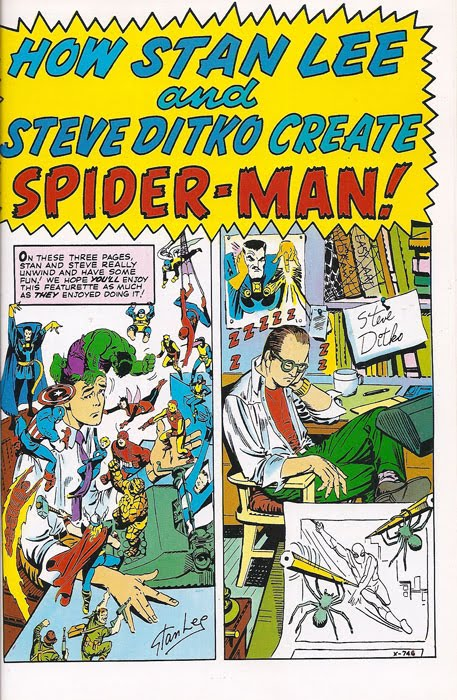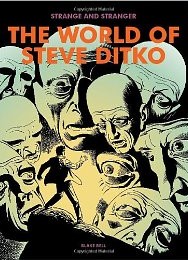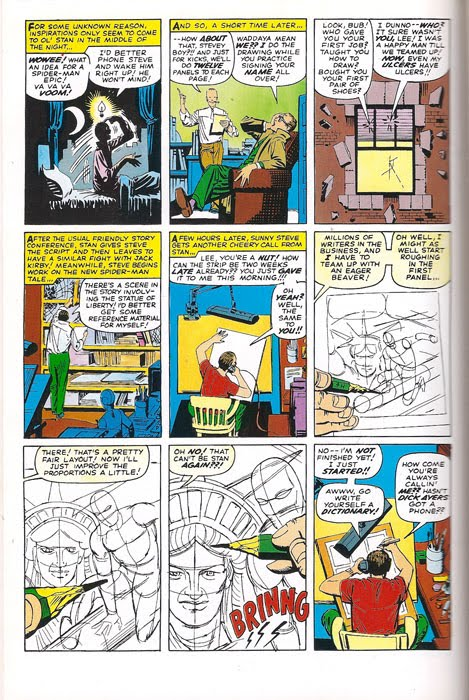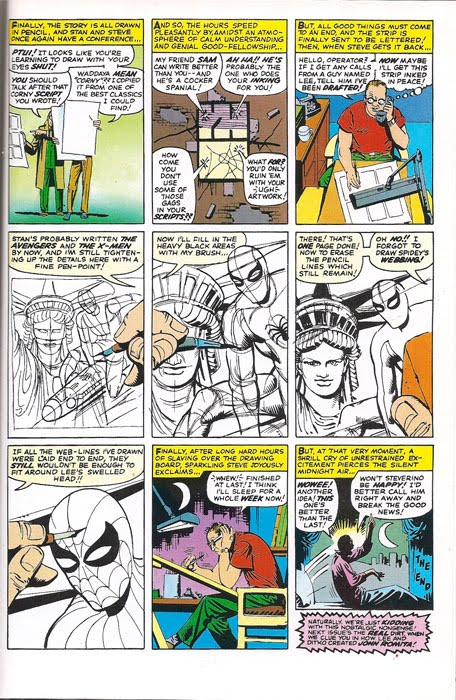Steve Ditko was quoted in the New York Post today–sort of. Here’s a link to the original article by Reed Tucker, with the title and subtitle:
Steve Ditko never got his due for co-creating the legendary superhero. And as “The Amazing Spider-Man” hits theaters today, the 84-year-old just wants to be left alone in his Midtown office, toiling away on doodles inspired by Ayn Rand
Ditko experts Tucker quotes in the article include Blake Bell, author of Strange and Stranger: The World of Steve Ditko, and Craig Yoe, author of the forthcoming The Creativity of Steve Ditko (following up on Yoe’s previous The Art of Steve Ditko
).
Strange and Stranger: The World of Steve Ditko
When Barry Pearl showed me the article this morning, my initial reaction was that Tucker’s headline and spin didn’t fit the Ditko quotes supplied in the article, what Dikto has said elsewhere, or the facts of the situation, and Tucker was reaching to make the facts fit his spin. You can read the article yourself and see if you agree with me.
In the article, Ditko had very little to say when the Post contacted him. When the interviewer asked Ditko if he was paid anything for the four recent Spider-Man movies, Ditko explained, “I haven’t been involved with Spider-Man since the ’60s.” Along similar lines, the article quotes Bell saying,
He could have made a big stink, especially when the first “Spider-Man” movie came out [in 2002], and he probably could have gotten a lot of money and publicity, but he didn’t.
Bell and the Post could have added that one reason Ditko hasn’t raised a stink is because he understands work-for-hire contracts and knew he was working for a per-page rate. But that wouldn’t have fit the spin that “Steve Ditko never got his due.” In point of fact, Marvel and fans alike have been giving Ditko his due since the 1960s. Ditko’s name appeared in the credits of the original run of The Amazing Spider-Man, and the artist himself was showcased in a backup feature in Amazing Spider-Man Annual #1 called “How Stan Lee and Steve Ditko Create Spider-Man!” in October 1964.

Ditko’s name also appeared in the credits of the recent Spider-Man movies. The last item is mentioned but downplayed in Tucker’s article.
I asked Barry if he had anything to add on the article. Barry went to our own resident Ditko Spider-Man expert Nick Caputo, who had this to say:
It’s funny that the author can call Ditko “the J. D. Sallinger of comics” yet knock on his door and speak to him. The author also reinforces stereotypes such as: it’s hard for fans to track Ditko down and that he was never particularly close to anyone he worked with. Why didn’t he speak to Robin Snyder to get another view? Or the many fans who wrote letters to him?
It’s nice to have Ditko’s name recognized as co-creator of Spider-Man, but most articles go down the same road and come up with the same conclusions.




“Bell and the Post could have added that one reason Ditko hasn’t raised a stink is because he understands work-for-hire contracts and knew he was working for a per-page rate.”
Roy, I’m not doubting your word, but what is your source for this statement? Did Ditko have a contract while he was at Marvel in the late fifties and early sixties? How do you know he understood the concept of work for hire? Please provide some proof of that.
Allen Smith
Allen, one of my majors was history, so I have no problem with someone asking for sources. First let me emphasize that this is my own wording summing up my understanding of the facts, not a direct quote from Ditko. Second, I have read and heard things to this effect from a number of sources (and I think it’s consistent with what Ditko says even in this Post piece if read closely), but the immediate source I had in mind as I was typing this sentence was a conversation I had before Tucker’s piece was published with a knowledgeable Ditko researcher who was paraphrasing Ditko’s viewpoint, referring to it in passing while we were talking about other topics. I will need to get permission from the person I was talking to before I can disclose any additional specifics beyond that. But you ask a valid question, and I will see if I can collect what is on the public record on this to better address it in a future piece.
Fair enough, Roy. The reason I asked the question is that, as far as I know, during depositions for the Marvel/Kirby litigation, several artists stated that they were not aware of the concept of work for hire, at least back in the sixties as they were producing for Marvel. Now, I haven’t read about the case very extensively, so I might well be wrong about this. I thought it likely that Ditko might not have been aware of the concept of work for hire in the early sixties. Thanks for replying.
Allen Smith
I understand that’s why it’s a significant question and documentation is important, so let me be precise about what I was saying there. When I said Ditko “understands work-for-hire contracts” my use of the present tense was referring to his current state of knowledge, which has increased since the Kirby litigation and since Ditko has gone through his own negotiations with Marvel. Of course everyone knows a lot more about work-for-hire today than before the Kirby litigation. Back in the early sixties I don’t think the technical legal term “work for hire” was in wide currency among artists, I think when people talked about the concept it was usually in informal layman’s terms such as freelancing, per-page rate, etc., and the contracts were often verbal rather than written, i.e. “we’ll pay you X for Y pages if you can get them done by Z.” I do have more information and documentation about what was common industry practice then, and I’ll see what I can put up on the site when I get a chance. But in the sentence from the present article that we’re discussing, I certainly wasn’t implying Ditko was an expert on the legal intricacies of work-for-hire contracts in the early sixties, and I don’t mean to leave that impression.